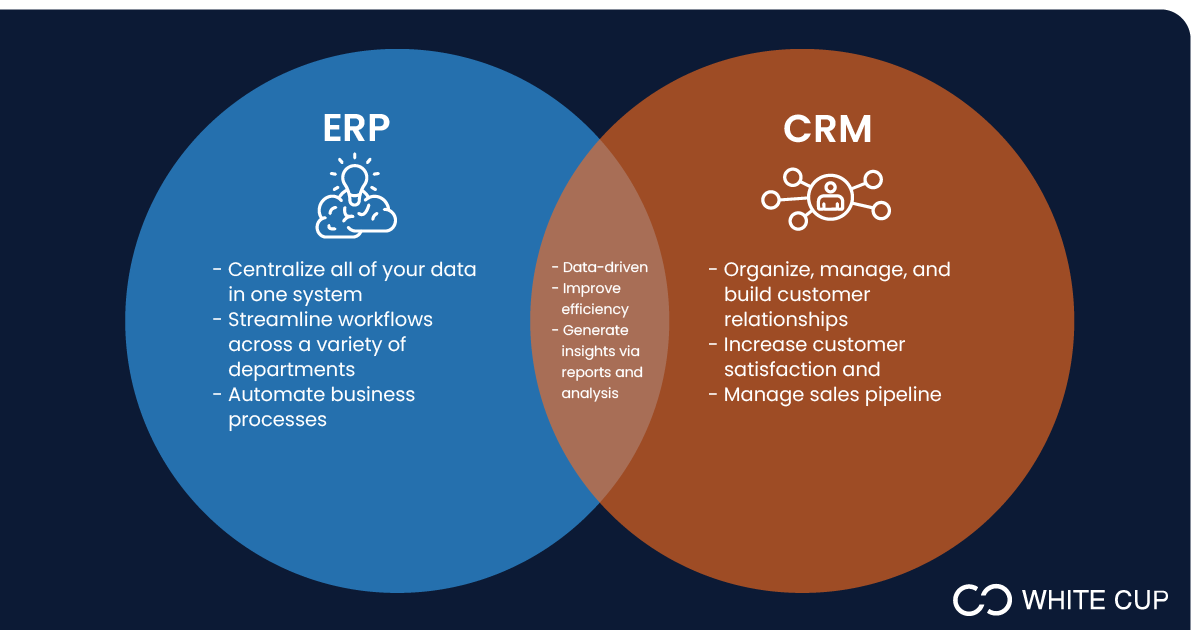
ERP vs CRM: Do Distributors Need Both?
Two of the most popular enterprise technologies for Distributors are enterprise resource planning software (ERP) and customer relationship management software (CRM). If one or both of these solutions have come to your attention, you have probably wondered what the difference is between ERP vs CRM and what each can provide for you.
At their core, ERP and CRM software are both designed to help businesses with their data and operations. However, where they differ is in their focus. CRM vs ERP systems come down to managing how customers interact with a business vs connecting and then automating business processes in a central database. Both serve vital roles for cross-departmental functions, and many businesses may consider having both critical for growth.
So, to clear things up, we will provide examples to examine CRM vs ERP and help you identify if you should buy one or the other, buy them separately, or buy them on the same integrated platform.
What is an ERP
Think of an ERP as a wide-casted net. It is a single system that takes all of your customer data and streamlines your projects business processes across many departments can be integrated into one platform. An ERP can take finance, supply chain, distribution, and even HR data and automate processes typically done manually in disjointed places.
For example, a common use case of ERP is automating purchase orders. With the software in place, you can have your POs sent to stakeholders for approval and then automatically forwarded to vendors once approval is received. No more back and forth or traditional paper POs.
Optimization is the key here. All of your data is stored in a single database which can then be accessed by any employee. Implementation of an ERP means centralizing all parts of your business and ensuring everyone is working in concert.
What is a CRM
If ERP is a wide-casted net, CRM software is the careful care you take of each animal you catch. Well, it’s not a perfect analogy. Nonetheless, a CRM is an integral component of how you organize, manage, and build your business relationships with your customers. CRMs are centered around relationships.
With a CRM, you will never need to wonder which of your contacts work at what companies or what messages have been sent about your work with each customer. It will identify who on your team last contacted each customer, fill you in on what to talk about at your next meeting, and even send follow-up messages to help you nurture your projects and leads.

ERP benefits
The benefits of ERP software include 4 major points:
- ERPs can automate financial reporting, inventory management, and distribution planning. All of this automation means that your business will be running much more productively.
- Cost-savings. By streamlining your operations, your team can spend more time contributing to critical tasks and less time worrying about busy work. This means you don’t need to pay somebody to do manual data analysis or processes.
- Decision-making. Using an ERP allows your business to see all of your data in one place. Using that centralized data you can build reports, measure performance, and ultimately make strategic choices based on the data.
- Using disconnected spreadsheets is a headache many growing businesses face at one time or another. With an ERP, you don’t need to worry about organizing your data no matter how much your operations grow.
CRM benefits
The benefits of CRM software also include 4 main points:
- Higher customer satisfaction. CRM is best at managing relationships, especially CRMs for distributors. Keep track of customer interactions and preferences so it’s easier to resolve customer issues or unique needs. Never walk into a meeting with a customer blind again.
- Sales and Revenue. In addition to your existing customers, CRM will help you build relationships with potential customers. Track your leads and opportunities and make converting prospects into cashflow easier.
- Smooth business operations. CRM systems allow you to automate tasks related to lead generation and management. Have your CRM track contact management so you can focus on customer service.
- A good CRM system should show you reports on your sales pipeline, customer activities, and even marketing campaign performance. Using this data, your business can make better operational decisions about your sales strategies.
Similarities
The main similarities between CRM vs ERP come down to optimization, data, and analysis.
- Both software are designed to automate some key business processes. Streamlining workflows leads to improved efficiency all around.
- They are both driven by data. They take data from your business and centralize the insights in one place.
- Both systems generate reports and analyses of the centralized data so that you can make informed business decisions.
Differences
As mentioned at the beginning of this article, the main difference between ERP vs CRM is in their focus.
- CRM software focuses on managing customers while ERP covers a broader range of functions like inventory, financials, and supply chain.
- As a result of their foci, CRM is more typically used by sales reps and marketing teams while ERP encompasses the management needs of a variety of departments.
- While both software increase visibility into your data, CRM increases visibility into customer data while ERP increases visibility into all administrative and operational business data.
Integration: One, the other, both?
Simply put, nearly all growing businesses will eventually need both an ERP and a CRM system. It will no longer be a question of ERP vs CRM, but a question of which ERP and CRM and integrating them. Whether you need one or the other to start comes down to your most immediate business needs.
If you struggle with customer relationships but run smoothly elsewhere, perhaps a CRM is a good place to start. If the opposite is true, maybe an ERP is a better fit right now.
If you’re expecting to scale your business, it’s a good idea to plan for the eventual integration of both systems. In that case, you’ll want to make sure that you’re purchasing an ERP that is compatible with your CRM and vice-versa.
Adopt a platform that allows you to scale your ERP’s data—add CRM, add BI, add Pricing
When choosing an ERP, consider preparing yourself for a future of scalability. Why stop at CRM? If you want to leverage your business data to the greatest extent (and give yourself the biggest competitive advantage), you’ll need to incorporate Business Intelligence (BI) software and Pricing software.
In that case, you need to make sure that you’re buying into a system that will be play-friendly and integrate seamlessly. Luckily, White Cup offers a comprehensive platform of CRM, BI, and Pricing technology laser-focused on growing your revenue and helping you beat the competition.



